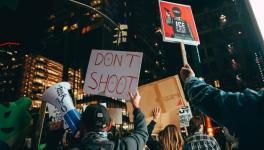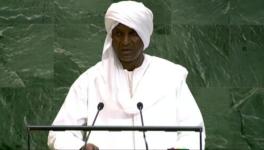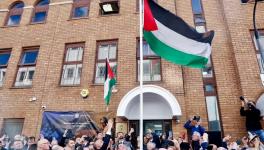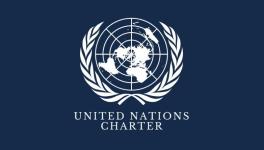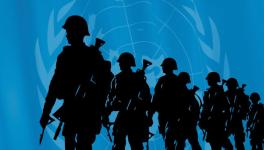Morocco Takes Aggressive Stance in Disputed Western Sahara, Detains Journalists
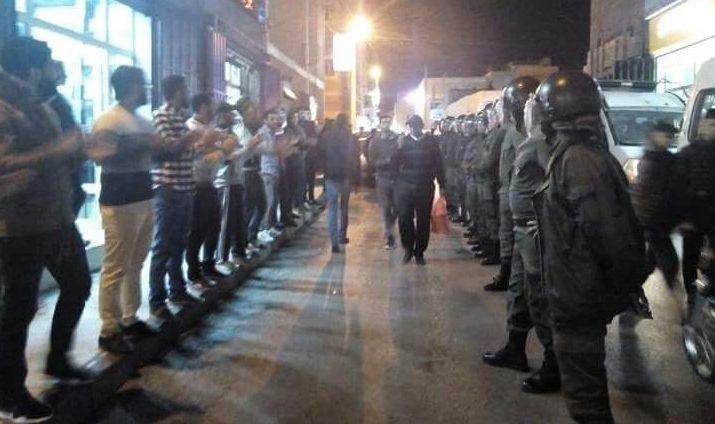
Unemployed Sahrawi youth stage a protest in El aaiun, the capital of Western Sahara
Tensions continued to rise in Western Sahara as two journalists were jailed even as political prisoners from the region were on the verge of intensifying a 32-day hunger strike at a Morocco prison. The striking prisoners later withdrew their protest after assurances from Moroccan authorities. Meanwhile, Morocco, which has occupied most of Western Sahara, took an aggressive stance in response to what it called ceasefire violations by the Polisario Front that seeks independence for the region.
On March 27, reporter Mohamed Salem Mayara and cameraman Mohamed Aljomayaai were arrested from a cafeteria in the city of Smara. They were accused of attempting to murder a policeman, placing barricades and humiliating a public servant on duty. The immediate provocation however seems to have been a Saharan TV report showing protests against the Moroccan occupation in the city, and subsequent attacks on protesters by Moroccan settlers. Injured protesters were allegedly denied aid at hospitals after the incident.
The two journalists are members of the Smara News Collective. Human rights activist Salet Batal said the collective had been able to expose the nature of repression in the city despite stringent restrictions on their work. Mohamed Salem Mayara and Mohamed Aljomayaai were in preventive detention for 72 hours and then transferred to a ‘black prison’ in the capital El Aaiún.
The Smara News Collective condemned the arrest calling it an attempt to “separate them from their activism and the media” and noted that both had been active in chronicling the issues faced by unemployed Sahrawis, as well as the struggle for self-determination.
Mayara has faced repercussions for his activism earlier too. He lost his job as a City Hall employee in El Aaiún and as a teacher. The two journalists will be produced in court only on April 24 to answer to charges.
Meanwhile, political prisoners from Western Sahara, currently incarcerated in Kenitra prison in Morocco, ended their 32-day fast on April 10 after officials promised to consider their demands. The four prisoners - Sidi Abdallahi Abbahah, Abdallahi Lakfawni, El Bachir Boutanguiza and Mohamed Bourial - had sought to be moved to prisons closer to their families in Western Sahara, and get access to medical care. The four are from the Gdeim Izik group and were among those handed stiff sentences after the Gdeim Izik protest camp was brutally demolished. The setting up of the camp in 2010 is considered to be among the incidents that sparked the Arab Spring. The trial of the activists was widely condemned by organisations across the world with Amnesty International reporting that the activists were tortured. Many protests were held in Western Sahara on the same issue.
Escalating situation
Last week, Morocco escalated the situation in the region by saying that all options were on the table. Morocco alleged that the Polisario Front was militarising the buffer zone between its areas and the parts occupied by the former. However, UN spokesperson Stephane Dujarric said that U.N. peacekeepers “have not observed any movement of military elements in the northeast territory.” Morocco has built a series of walls in Western Sahara, which has mineral-rich minefields Saharawi activists have accused France and the U.S of supporting Moroccan demands to the detriment of the people.
Morocco and Mauritania annexed Western Sahara in 1975 after Spain, which had earlier colonised the territory, left. Resistance by the Polisario Front led to the formation of the Sahrawi Arab Democratic Republic and the withdrawal of Mauritania from the conflict. A U.N. brokered ceasefire saw the establishment of an United Nations mission aimed at conducting a referendum. However, disputes over the number of voters and increasing Moroccan opposition to having independence as an option in the referendum have led to its delay.
In 2016, the then-U.N. Secretary General Ban Ki-moon had used the word occupation while referring to the Moroccan control of Western Sahara.
For more details on the struggles of the Sahrawi people, read this interview.
Get the latest reports & analysis with people's perspective on Protests, movements & deep analytical videos, discussions of the current affairs in your Telegram app. Subscribe to NewsClick's Telegram channel & get Real-Time updates on stories, as they get published on our website.









